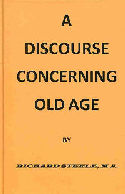Septuagint
The Septuagint
Sometime between the 4th and the 1st century BCE, Jewish scholars, in an attempt to broaden the reach of the Jewish Bible, translated the bible into Greek, producing the_Septuagint. Due both to the process of translation as well as the source material, this translation resulted in extra books being added to the canon which are not generally recognized by Orthodox Jews or Protestant Christian Churches. The Septuagint is one of the main sources for the Greek authors of the New Testament.
The_Septuagint, not the Hebrew texts used by Judaism and modern Christian Bible translators, is still the official form of the Old Testament as used by most of eastern Christianity.

Steele A Discourse Concerning Old-age is a 109 page work on Christian Counsel to those who are aged, looking at different aspects of old age from a Christian point of view. This is an old work, but sound advice from Scripture is timeless.
PDF: Steele A Discourse Concerning Old-age.PDF
OpenOffice: Steele A Discourse Concerning Old-age.odt
theWord: Steele A Discourse Concerning Old-age.twm
eSword: Steele A Discourse Concerning Old-age.topx
MySword: Steele A Discourse Concerning Old-age.mybible
In Jewish tradition (and in the Talmud) the Rabbis translated the Torah, the five books of Moses, and the other books were translated by others. This led to the incorrect translation in Isaiah 7:14 of “עלמה” (“almah”) to “virgin”.
taken from rationalwiki.org/wiki/Guide_to_Bible_translations
The Septuagint has a very important position in the matter of early transcripts mostly because this is the Greek version that Jesus and his followers used as a rule (though sometimes they did break with the LXX and directly translated from the Hebrew, and at other times they used a translation that scholars are just not sure where they got it from).
–DCox
See https://en.wikipedia.org/wiki/Septuagint
Advertisement
In Greek Grammars and Helps #3 I give the Bible Student several recommendations in Greek Study, grammars to check out.
